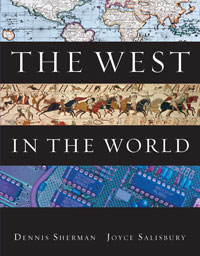 
The West in the World, 4th Edition (Sherman)Chapter 2:
The Contest for ExcellenceCritical Thinking Questions- The Rise and Fall of Ancient Heroes, 2000 - 800 B.C.
- What kinds of ideals did Homer's Iliad encourage among Greek men?
- How did geography shape the rise of ancient Greek society?
- What innovations did Minoans take from other civilizations? How did they improve or alter those innovations?
- What are some possible explanations for the destruction of Minoan civilization? What about the disappearance of Mycenaean civilization?
- In what ways did the Mycenaeans build upon the achievements of their predecessors? What limitation did Mycenaeans share with ancient Middle Eastern civilizations?
- Emerging from the Dark: Heroic Beliefs and Values
- Describe the spread of Greek culture in the Dark Ages. What happened to Greek culture in the colonies over time?
- Describe the values and virtues associated with arête. Why was it important in Greek life?
- What are some of the criticisms of Greek society made by Hesiod in his Works and Days?
- In what ways did the worship of Dionysus allow women to escape from traditional roles?
- What was the contribution of Thales to western thought? Democritus? Pythagoras?
- Life in the Greek Polis: 700 - 489 B.C.
- How did warfare change around 700 B.C.?
- Describe the polis and some of its features. How was economic life organized? How was society structured? What roles did women play?
- What did the Greeks believe about male-male relationships?
- What were the advantages of being a prostitute in Greek society? How did this contrast with women's roles in households as wives?
- What were the larger goals of Solon's reforms? What were his most important reforms?
- How did the Ecclesia differ from other forms of representative democracy? What were the limitations of this form of democracy?
- Why did a large helot population emerge in Spartan society?
- How was Spartan society organized? What were the main advantages and disadvantages of that social organization for women?
- What did the Olympic games indicate about Hellenic culture in general?
- Imperial Athens, 489 - 439 B.C.
- What were the events leading to the Battle of Marathon? What was the outcome of this battle?
- How did Herodotus' history break from the Greek heroic tradition of storytelling? What were the major achievements and shortcomings of his historical writings?
- What made Pericles an outstanding leader? What were some of the major changes in Athenian society and governance that he instituted?
- What were the warnings of Aeschylus to his fellow Athenians? What was the message of Sophocles?
- Destruction, Disillusion, and a Search for Meaning
- What were the causes of the Peloponnesian War?
- What events gave the Spartans the upper hand after 430 B.C.?
- What ideas did the Sophists promote? How did Socrates' ideas constitute a reaction against the Sophists?
- What was Plato's conception of an ideal government? How did Aristotle depart from Plato's teachings?
- What were the uses of tragedy in Greek life? What about comedy?
- What were Hippocrates' contributions to the founding of modern medicine?
- How did the poleis suffer in the aftermath of the Peloponnesian War?
 |  |
|





